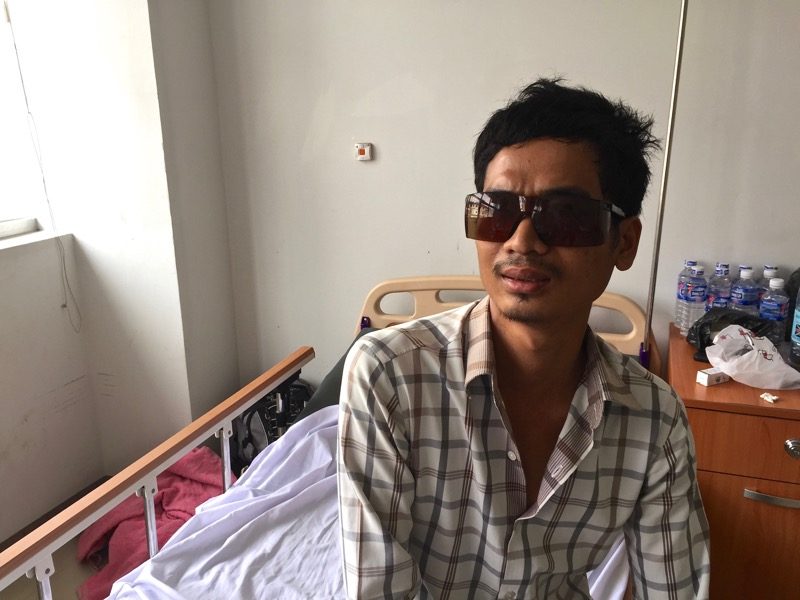Nut Borin donned oversized sunglasses as he sat on a hospital bed in Phnom Penh last week, about a decade after he first noticed strange things happening with his eyesight.
The 27-year-old garment factory worker from Kampot province was recovering from cataract surgery. His right eye was operated on the previous day; his left two days earlier.

“Before I had surgery, I did not see very well. I opened my eyes for a short time and then had to close them,” Mr. Borin said, adding that he started struggling to see when he was 18.
“I felt like there were stones in my eyes,” he said.
A relatively quick and easy cataract surgery changed that. When the nurse removed the bandages from his eyes after the operation, “I could see my mom and sisters,” he said.
More poor patients living with cataracts like Mr. Borin will soon have the opportunity to undergo surgery free of charge at the Cambodia-Korea Friendship Eye Center at Preah Ang Duong Hospital in Phnom Penh, following the signing of an agreement between the hospital and NGO Khmer Sight Association (KSA) on Friday.
Cataracts, a clouding of the lens of the eye, are the leading cause of blindness in the country, and the vast majority of cases are avoidable, according to The Fred Hollows Foundation, an international eye health NGO.
The prevalence of blindness in both eyes due to cataracts reached nearly 2 percent, or an estimated 29,300 people, in 2007, according to Health Ministry data. And about 5 percent of the population over 5 years old had some or a lot of difficulty seeing or could not see in 2014, according to the most recent Cambodia Demographic and Health Survey available.
Nevertheless, in the past 20 years, the prevalence of avoidable blindness has decreased by nearly 70 percent, according to The Fred Hollows Foundation.
The trend is the result of a greater focus on treating and preventing eye ailments by both the government and health NGOs, according to medical professionals.
“There has been a decrease in the prevalence of blindness as more and more cataract surgeries have been conducted,” said Damian Facciolo, a regional program manager at the International Agency for the Prevention of Blindness, in an email.
From 2004 to 2012, the volume of cataract surgeries has quadrupled, according to data from the Health Ministry’s National Program for Eye Health.
Ngy Meng, the program’s chairman, said the government was able to curb blindness thanks to better health infrastructure.
Eye health services were available at 21 out of 80 provincial and district referral hospitals, according to the Health Ministry’s national plan for blindness, released in 2011.
Dr. Meng said that along with about 20 facilities around the country that could perform cataract surgery, there were also mobile eye units, which allow doctors to perform cataract surgeries in rural areas far from provincial hospitals, to fill the gaps.
“Every year, we have increased capacity,” he said.
But for most patients to get the surgery, they need about $100 for a standard surgery by hand or more than $300 for a machine-assisted procedure.
At Ang Duong Hospital’s eye center, the five-year memorandum of understanding (MoU) with KSA will provide new surgical equipment, increase the number of poor patients able to get free eye surgeries and allow for the training of local doctors by foreign volunteers, said Kong Piseth, deputy director of the hospital and chairman of the ophthalmology department.
“We need more to help people with blindness get knowledge and share experiences with each other,” Dr. Piseth said. “The quality of the surgery will go up.”
The hospital currently employs 20 ophthalmologists, including 12 surgeons who together perform about five cataract operations each day, he said.
Once the MoU takes effect in April, the program hopes to boost the number of surgeries per day to as many as 100 to 180, helped by international surgeons who would volunteer for 10-day stints in Phnom Penh, said Sean Ngu, KSA’s founder.
“The surgeries will start at 7 a.m. till 6 p.m. each day with six surgeons plus one standby to rotate,” he said.
Soeung Soryoun, an eye surgeon at Ang Duong who performs two or three operations a day, said the new program would help overcome one of the biggest barriers preventing people from having the surgery.
“They don’t have money to go to the hospital,” he said. “They have to delay their cataract surgery until their vision is very bad.”